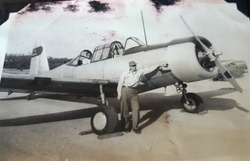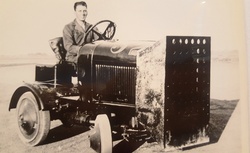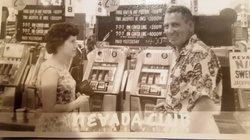Robert William "Bob" Jordan
Rohr Aircraft Memories
“a website for the Rohr Retirees and Former Employees Club”
Fairhope | Foley | Fresno | Fullerton | Garland | Hagerstown | Hamburg | Heber Springs | Huntsville | Irvine
Los Angeles | Loudenville | Mexico | Millersburg | Mira Loma | Moreno Valley
Paris | Richmond | Riverside | Rockville | San Diego | San Marcos | Sheridan | Toulouse | Washington D.C. | Winder
Advanced | Aerospace | Antenna/Marine | Communications | Computer | Construction | Credit Union | Material | Postal | Rail | Transit
Bibliography | Guest Book | Looking For... | Memorabilia | People | Rohr, Fred | Timeline
AeROHRcrafter | Rohr Magazine | Rohr News | News Clippings | Contact Us
Chula Vista
My Dad, My Hero
Written by Robert Franklin Jordan 7/12/13
Tim ,
You asked me to write a brief history of my Dad, W.R. Jordan. W.R. stood for William Rober. His real name, given at birth was Walter, Robert Jordan. He did not like the name Walter and changed it to William. I don’t know if it was ever done legally or not – I doubt it, but all records show him as William, Robert Jordan and he always went by “Bob”. I remember his mother came to live with us in New Orleans around 1943 or 1944 and she still called him “Walter”. I know he did not like that at all. Dad was born on April 1st, 1910, April Fools day and I’m sure he got razzed plenty about that. His Birthplace was Hominy, Oklahoma, just a few miles northwest of Tulsa. Mom (Bobbe) and I visited Hominy about 12 years ago and found it was a small quaint town with little change over the years it appeared.
Dad’s family – mother, father, 2 brothers and 1 sister left there around 1917 or 1918, I’m guessing. They moved to San Francisco, Richmond District and my dad attended elementary school there. He learned to swim at Sutro Baths, a famous swimming place in SF for many years and was destroyed by fire around 1965. Dad told me he use to race the cable cars along Geary Blvd when he was growing up. The story goes that he could not go on to the 5th grade because he didn’t own a pair of shoes. That sounds incredible but I remember hearing him and my mother telling me that several times. So when things got really bad around 1920 or so, the family moved to Lake County and squatted (not owning or renting anything) on Cashe Creek. Somewhere along the way (he never told me or talked about it) his father left the family to fend for themselves. I don’t know if he ever sent them money or not, my dad never talked about his father. Ted Luce did some research on the internet and found a Theador Walter Jordan from Hominy, OK, (must have been his father – my great grandfather), a Doctor who moved to Salt Lake City, Utah around 1920 and had another family. That is why my dad had a Mormon background even though he never went to church as long as I can remember.
His family lived in squalor conditions in Lake County with little or no money. He took me there when we lived in Chino around 1945. He had left there when he was 16 or 17. I couldn’t believe where his mother was living. It was scrap wood and corrugated tin nailed together and had no floor except for rugs over dirt. It smelled awful and my dad was in tears when he saw it and I know it hurt him a lot. I think he gave money to his brother Charlie to get her a better place to live.
When he was old enough to leave home (around 1927 or 1928) he left and joined the Army Air Corp (Air Force today) and really began his education and very good training. Because he had good mechanical skills, the Aircorp put him in the mechanical training and this started his love of airplanes and flying. I’m sure he took to this new life like a duck takes to water. I know he was very dedicated to his new life and realized the potential of the aircraft and flying industry. He was stationed in San Antonio, Texas (as far as I know that was the only place except for Rantoul, Ill – Chanute Field where I was born 5 years later). He earned his A&E License there (Aircraft and Engine) and that is where he met my mother Margene Field. Mom left home when she was only 18 (that is also quite a story) to be a nanny for a family in San Antonio. While she wasn’t Nanning she worked part time in a dime store across the street from the Alamo. We visitied the Alamo, I think you kids were with us, and I took pictures of the store where she worked. When we got back to Portola Valley and showed her the pictures, she started to cry.
They were married in September 1932, I think in San Antonio, and then dad got transferred to Chanute Field Ill. I was born in July 1933. Dad got discharged around that time and immediately got a job as a mechanic for Chicago Southern Airlines and we lived on and off in Chicago several times. Other places where dad worked for Chicago and Southern Airlines and we lived were Memphis, Dallas, New Orleans and I think even in St Louis for a short time. Dad moved up very quickly with the Airlines and was one of their top mechanics after a few years. He worked for Eastern Airlines for a while and American Airlines and we moved around a lot. I don’t even know all the places we lived, but I seemed to spend most of my summers on the farm in Hoopeston, Ill with my grandparents, aunts and uncles.
Dad was a very good athlete and was always in good shape, except for smoking. I’m sure you remember he was never overweight even when he got older hes hear was in good condition. I think he would still be alive if he hadn’t smoked so much. He would have been 113 this last April 1st.
Dad tried to join the Air Force during WWII but was rejected because of his age and was a father of a young child and because he could help more at home than he could in the military. This he did very well. When we moved to Chula Vista around 1944, he worked for Consolidated Valtee (?) making and testing airplace parts. I don’t know what he did exactly but he changed jobs and I’m sure got a pay raise when he worked for Rhor Aircraft, also in Chula Vista. While working for Rhor, and only 11 years of working, he invented the “Spot Welder” which put “Rosy the Riveter” out of a job. The Spot Welder was a new and revolutionary method of fusing two pieces of sheet metal together (without a rivet) and I think it is still in use today. Dad got paid $50 for his invention and I’ll bet old “Pappy” Rhor made millions off of the patent because it changed aircraft production dramatically. I remember going to “Pappy” Rhor’s home in La Jolla (very plush) and he singled out my dad as a pioneer in aviation for this invention. We lived in a government housing project while in Chula Vista (which I loved) at the end of “J” Street. I went to Hilltop Elementary for the 5th and 6th grades. I remember I had a paper route delivering the San Diego Sun (?) on Sundays. There were 300 homes in the project and I think 298 took the Sunday paper. The Sunday paper was huge and I could only carry 10 or 15 papers at a time on my bike. It took me most of the morning to get them all delivered and when I couldn’t collet from a few of them, my mom went and collected and she always came back with the money. She also helped me fold them and get them ready to deliver. Everything was rationed in those days – meat, eggs, gas, etc. We had “A” posted on our cars windshield which I think meant we got more gas than the ones with a “B” or a “C”. We always had plenty of gas but not meat. My mother said I never ate meat until it was rationed and then I ate most of our allotment because I was growing so fast. When we left for Chino in 1946 I was 13 years old and nearly 6’2 and 180 lbs. No wonder why dad never gained any weight.
Anyway, back to dad. He got a good job in AZUSA testing jet engines in 1946 with Aerojet. Jet engines were just starting to come in then and Aerojet was a major testing and manufacturer . AZUSA, which stands for everything in USA from A to Z, was about 20 miles north of Chino where whe moved to from Chula Vista. We lived on Euclid Ave about 1 mile from the Chino airport which was called Calero Airport in those days. This was right after the war ended and Calero was a major depository for all military aircraft to be sold or cannibalized for parts on the west coast. They (government) were selling all kinds of airplanes for very little, if you hauled them away. I went there with dad and the whole airport was covered with airplanes – B-25’s, B-26’s, P-51’s, P-38’s – bombers, fighters and BT-13’s. Every pilot who learned to fly during WWll trained in a BT-13. My dad just had to have one of these! They had a big powerful engine – metal fuselage and fabric covered wings, and they were only $100 each cash plus you haul. Since we lived only a mile away, my dad bought one, took the wings off and towed the wings and fuseloge to our home on Euclid Ave, which we rented. Next door was a huge vacant garage used for storing walnuts. Dad rented the garage and his “love of life” began. He re-worked the engine and re-covered the wings. That was my stinky job – the goop we put on the fabric was smelly and it tightened the fabric as tight as a drum. Dad worked on his project for several months (mostly weekends) and when it was completed he (we) hauled it to Burbank Airport (in the middle of the night) where he assembled it, had it inspected, licensed and sold it for $500. I don’t know if he made much money on it or not, but I Know it was his passion and it was beautiful to see it all come together. As ofr his job at Aerojet, 20 miles away, we could hear the jets like they were a block away when they were testing them. I remember telling my friends when we heard them that my dad was testing the next engine for our jet fighters.
William Robert Jordan in the early 50's in front of at BT13 that he bought from the US government for $100. This picture was taken after he had restored the aircraft.
Sitting on some sort of tractor.
Nevada Club of Las Vegas with his wife, Margene.
The next adventure, it was 1948 and my dad’s long time friend Carl Baker, who was also an aircraft mechanic, told my dad that the airlines were taking applications to train and license “Flight Engineers”, a new and well paying job. My dad jumped on the prospect of more money and a new responsibility. He and Carl were 2 of the very first “Flight Engineers” licensed. Dad started working for Slick Airways hauling military cargo. With dad making more money and my mom working at Montgomery Wards we were able to rent a better home in town (Chino) so I could finish High school there. A year after that they bought their first (of 2) homes for around $12K just west of town, that would have been 1950 or 1951. It was a small house – about 1000 sqft, 2br 1ba plus 1 car garage but a huge lot (where I farmed and raised a calf). They lived there for only a few years and sold it around 1955 for $10K. I left that home and Chino when I was drafterd at 19 for the Korean War and never returned to Chino .* Mom and dad rented out the Chino home and moved around a lot, living in England for a year while dad trained British Flight Engineers. They lived in Tokoyo for a while and also Bangkok. Dad was making good money but like a lot of people never put enough away for a rainy day and very soon it became a rainy day. His smoking finally caught up with him at about 60 years old and he had to quit flying. He had worked about 20 years as a Flight Engineer and a good pension only to see it vanish in an instant. “Corporate Raiders” bought his company and took all but a small portion of the pension fund and then filed bankruptcy leaving dad and many others to live on Social Security. They ended up living in mobil homes rather than real homes. I never heard my dad complain about what happened to him financially. I think it was because he got to live his dream – a kid from a very poor home life and little education to make it to the top of his profession was more than he could have dreamt of. Dad died in 1979. He was 69.
I miss you, Dad
Son – Bob
*After dad had been a Flight Engineer for about 10-12 years, ALPA (Airline Pilots Assoc) got a rule passed that all Flight Engineers had to have a Commercial Pilots License so they could get more jobs for all the pilots knowing fully that it would eliminate many jobs for the non-pilot Flight Engineers. Dad would have been one that would likely lose his job with the 4th grade education but dad persevered with the help of my mom. She worked with him on some of the math and other complex issues of the written portion. Dad passed all of the written tests and then did all of the flying required and won his Commercial Pilots license and kept his well paying job. He never flew as a pilot but won one of the greatest battles of his life.
Submitted by Tim Jordan, January 24, 2018
The Rohr Aircraft Memories website is owned by Sue Poole.
Opinions expressed on these pages are not necessarily those of the site owner.
All content is @2006-2018 Sue Poole unless otherwise credited or a vintage reprint.
Last updated: 02-21-2018


